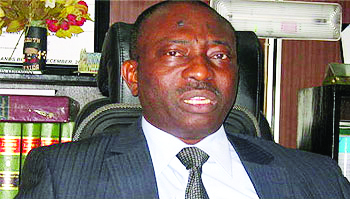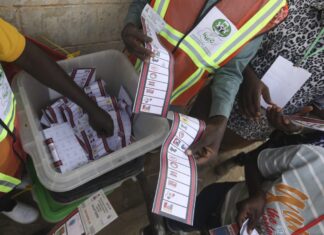The exit of some African countries from the International Criminal Court (ICC) has raised serious concerns among member nations. Senior Correspondent, ONYEWUCHI OJINNAKA, x-rays the development.
There is expression of fear that more African countries may pull out from the International Criminal Court (ICC). The development could be tagged Afri-Exit. The reported exit of some African countries from the world’s first permanent war crimes court seems likely to threaten the continued existence of the court.
ICC is an intergovernmental organisation and international tribunal which sits inThe Hague, The Netherlands.
The court set up in 2002 is often accused of bias against Africa and has also riddled by lack of cooperation, including from the United States, which signed the court’s treaty but has never ratified it. The tribunal is tasked with prosecuting very serious crimes that shock the conscience of humanity, namely genocide, war crimes, crimes against humanity and crimes of aggression.
Earlier in October 2016, South Africa and Burundi took decisions to withdraw from ICC, and not too long, The Gambia followed.
South Africa formally began the process of withdrawing from the ICC by notifying the United Nations of its decision, positing that its continued membership of the ICC created a conflict with its role as a regional peace-broker. However, news of South Africa’s exit came as a surprise to the outgoing UN Secretary-General, Ban Ki-moon, who said, “We did not see this coming.”
Also, announcing its decision to pull out, The Gambia’s information minister said the ICC had been used “for the persecution of Africans and especially their leaders”. The country accused the court of “persecution and humiliation of people of colour, especially Africans”.
Sheriff Bojang, the information minister, announced on state television that the court focused on Africans while ignoring crimes committed by the west. He cited the case of the former British Prime Minister, Tony Blair, whom the ICC decided not to indict over the Iraq war.
“There are many western countries, at least 30, that have committed heinous war crimes against independent sovereign states and their citizens since the creation of the ICC, and not a single western war criminal has been indicted,” he said.
According to him, the withdrawal “is warranted by the fact that the ICC, despite being called International Criminal Court, is in fact an ‘International CaucasianCourt’ for the persecution and humiliation of people of colour, especially Africans”.
Other African countries that may withdraw include Kenya, having sustained campaign to paint the court as a “neo-colonialist” institution being used as a tool to oppress Africans. Chad, Democratic Republic of Congo, Central African Republic, Namibia and Cote d’Ivoire could follow suit.
Reasons for withdrawal
Some of the most respected African legal minds are uncomfortable with its inherent contradictions, more so when the U.S. refuses to become a member or be bound by its rules. According to Thuli Madonsela, South Africa’s former anti-corruption chief, “Some of the world leaders are part of the judging, but they are not bound by it. It is like saying: I will be the judge, but my children and I will not be bound by it. It creates a very unhealthy dynamic.”
Expressed reservations
However, despite its shortcomings, Madonsela, like many others, is sceptical about general withdrawal.
“It is better to have an imperfect court than none at all. It is like saying, because we do not catch all the criminals, we should not hold trials,” he said, butcriticised the U.S. and European Union (EU) for arm-twisting African countries to submit to the court’s will.
“Africa is not a third-rate territory of second-class peoples. We are not a project, or experiment of outsiders,” he said.
Despite the well-rehearsed rebuttal that many of the cases heard by the ICC are referred by African states, the issue of bias has been a sustained part of the anti-ICC narrative.
Witnesses not protected
The protection of witnesses at the court has also exposed severe weaknesses. The intimidation of prosecution witnesses in some cases has eroded the confidence of member nations on ICC. The court has no police force of its own to arrest indicted war criminals and only has limited financial means of protecting witnesses who testify. So many who may have had crucial evidence, which may have helped convict powerful leaders, have retracted their statements and sought sanctuary in silence.
Any alternative to ICC?
According to many African Union (AU) members, an alternative to ICC is to bolster Africa’s own institutions. The conviction of Chad’s former leader,HisseneHabre, by a court in Senegal earlier this year is a clear indication that there is a thirst for justice, but the problem remains Africa’s political will to strengthen regional courts.
“I like the idea of regional courts, but the problem is that there is always regional politics to it,” says Madonsela. He expressed that many would agree there is no shortage of expertise and technical talent on the continent, but promises to strengthen regional courts have moved at a freezing pace.
He cited the case of Habre who was sentenced to life for crimes against humanity in the first AU-backed trial of the former ruler, pointing out that the African Court on Human and People’s Rights was established under the auspices of the AU in 2009, but it has found itself mired in bureaucracy, delivering just one major judgment in 2009.
ShadrackGutto from South Africa’s Institute for African Renaissance Studies agrees it is time for reform, but says the AU should consider a system which works in parallel to the ICC – not scrap it altogether.
“We have a lot of corporate crimes being committed in Africa, and yet they are not being dealt with by the International Criminal Court.
“We could set up a mechanism to deal with this. There are weaknesses at the ICC for sure, but that does not mean we should allow ourselves to just simply move out.”
Rescind your decision
Following the withdrawals from ICC by African countries, the court has asked South Africa and others to reconsider their decisions to leave, which came as a major blow to the institution.
“I urge them to work together with other states in the fight against impunity, which often causes massive violations of human rights,” Sidiki Kaba, president of the Assembly of State Parties to the ICC Founding Treaty, said.
Kaba said he was worried that South Africa and Burundi’s decisions would pave the way for other African states to leave the court.
The court’s former chief prosecutor, Luis Moreno Ocampo,criticised Burundi and South Africa, accusing them of giving leaders on the continent a free hand “to commit genocide”.
“Burundi is leaving the ICC to keep committing crimes against humanity and possible genocide in its territory. Burundi’s president wants free hands to attack civilians,” said Ocampo.
He pointed out that the former South African president, the late Nelson Mandela, had “promoted the establishment of the court to avoid new massive crimes in Africa and was sustained by Mbeki but now under the Zuma leadership, South Africa decided to cover up the crimes and abandoned African victims. The world is going backward.”
Lawyers react
Nigerian lawyers expressed their view on the exit of some African countries from ICC. A former Lagos State solicitor-general and permanent secretary in the Ministry of Justice, Lawal Pedro (SAN), said the withdrawal is really weakening the potentials and viability of ICC.
Said he: “The withdrawals is sending a wrong signal to ICC and the international community.”
Speaking with TheNiche on whether Nigeria should pull out like others, Pedro said: “I do not think there is need for Nigeria to leave. Nigeria has no reason to leave the ICC for now.”
Other countries that have reasons can leave, he said, adding: “They can decide to exit if they have cogent reasons to do so.”
Another legal practitioner, AdetokunboMumuni, noted that what obtains in ICC is that America has set separate standards for leaders of developed and those of developing countries of the world.
“In the ICC, there is double standard. Those alleged to have committed crimes are Africans, whereas any person from the developed world is never indicted. The laws are applied mainly on developing nations and not developed nations.”
He stressed that to be free from the discrimination, African leaders should ensure and practise true democratic culture. “Africans should rule and govern themselves with transparency and accountability.”
Speaking on whether Nigeria should pull out, he said it is a foreign policy. “Nigeria is seen as giant of Africa and leader, and therefore should not pull out. If Nigeria pulls out, there would be mass exit of African countries from ICC. I will not advocate for Nigeria to pull out.”
A Senior Advocate of Nigeria (SAN), Joseph Nwobike, noted that ICC is losing its integrity and moral authority to adjudicate over crimes against humanity.
“The interpretation of crimes against humanity depends on where one comes from. What is the logic when the principles and philosophies of ICC is not taking international reasoning and standard for everyone?” he said.
Nwobike said the AU should act as one and not on individual countries. “AU should have a bloc position and not individual position. AU should have a common position to achieve whatever (the member states) want to achieve.”













